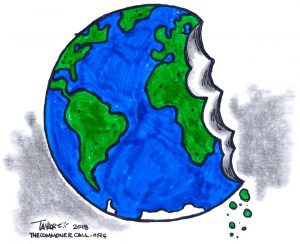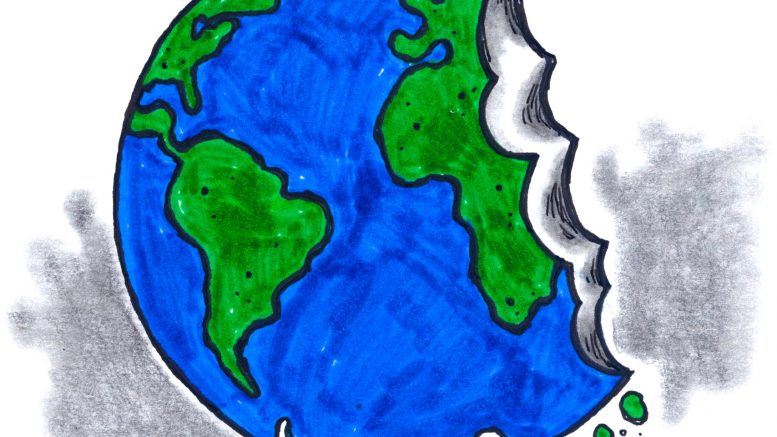
“Munch, munch…”
By Jonathan Watts
The Guardian (7/22/18)
Humanity is devouring our planet’s resources in increasingly destructive volumes, according to a new study that reveals we have consumed a year’s worth of carbon, food, water, fibre, land and timber in a record 212 days.
As a result, the Earth Overshoot Day – which marks the point at which consumption exceeds the capacity of nature to regenerate – has moved forward two days to 1 August, the earliest date ever recorded.
To maintain our current appetite for resources, we would need the equivalent of 1.7 Earths, according to Global Footprint Network, an international research organisation that makes an annual assessment of how far humankind is falling into ecological debt.
The overshoot began in the 1970s, when rising populations and increasing average demands pushed consumption beyond a sustainable level. Since then, the day at which humanity has busted its annual planetary budget has moved forward.
Thirty years ago, the overshoot was on 15 October. Twenty years ago, 30 September. Ten years ago, 15 August. There was a brief slowdown, but the pace has picked back up in the past two years. On current trends, next year could mark the first time, the planet’s budget is busted in July.
While ever greater food production, mineral extraction, forest clearance and fossil-fuel burning bring short-term (and unequally distributed) lifestyle gains, the long-term consequences are increasingly apparent in terms of soil erosion, water shortages and climate disruption.
The day of reckoning is moving nearer, according to Mathis Wackernagel, chief executive and co-founder of Global Footprint Network.
“Our current economies are running a Ponzi scheme with our planet,” he said. “We are borrowing the Earth’s future resources to operate our economies in the present. Like any Ponzi scheme, this works for some time. But as nations, companies, or households dig themselves deeper and deeper into debt, they eventually fall apart.”
The situation is reversible. …
- Earth Overshoot Day marks the date when we (all of humanity) have used more from nature than our planet can renew in the entire year. We are using 1.7 Earths. We use more ecological resources and services than nature can regenerate through overfishing, overharvesting forests, and emitting more carbon dioxide into the atmosphere than ecosystems can absorb. Read the Rest
(Commoner Call cartoon by Mark L. Taylor, 2018. Open source and free for non-derivative use with link to www.thecommonercall.org )
*****
As Wildfires Rage & Heat Records Broken Worldwide, Corporate Media Urged To Cover Climate Crisis’ Link To Extreme Weather
By Julia Conley
Common Dreams (7/24/18)
Climate scientists sounded alarms on Tuesday as reports circulated of extreme weather and record-breaking high temperatures all over the globe, with dozens of deaths and thousands of hospitalizations reported in some countries—while one journalist with a major platform on corporate cable news admitted the news media’s failure to give serious attention to the link between the climate crisis and such events.
On social media, climate action groups and advocates catalogued the overwhelming number of fires, droughts, floods, and heatwaves that have been exacerbated by the climate crisis in recent days and weeks.
Climate scientists sounded alarms on Tuesday as reports circulated of extreme weather and record-breaking high temperatures all over the globe, with dozens of deaths and thousands of hospitalizations reported in some countries—while one journalist with a major platform on corporate cable news admitted the news media’s failure to give serious attention to the link between the climate crisis and such events.
‘Biblical disaster’
On social media, climate action groups and advocates catalogued the overwhelming number of fires, droughts, floods, and heatwaves that have been exacerbated by the climate crisis in recent days and weeks.
Greek Interior Minister Panos Skourletis called the wildfires that have killed at least 74 people “a biblical disaster” in an interview with Sky News. The fires began late Monday afternoon near Athens, and have injured nearly 200 and sent thousands of people racing toward the Aegean Sea to escape in boats, makeshift rafts, and even by swimming.
Entire towns have been wiped out by the blazes, which have been made worse by a recent drought and heatwaves that have sent temperatures into the hundreds.
In Japan, at least 65 people have been killed in the past week by an “unprecedented” heatwave, according a weather agency spokesperson. Temperatures as high as 106 degrees have sent more than 22,000 people to hospitals—more than any other year since the country began recording cases of heatstroke in 2008.
In southern Laos, hundreds of people went missing on Monday after flooding caused by heavy rains resulted in a collapsed dam. Thousands of homes were destroyed and an untold number of people were killed as the equivalent of two million Olympic swimming pools of water burst into several villages.
Arctic Circle wildfires
And in northern Sweden, above the Arctic Circle, more than 50 wildfires have raged in the past several days, forcing dozens of people to evacuate their homes.
The climate action group Friends of the Earth noted that record-breaking high temperatures have been recorded in a number of other regions and cities in recent days, including the United Kingdom; Ottawa, Canada; Southern California; Ouargla, Algeria; Tibilisi, Georgia; and Sydney, Australia.
“There is no doubt that the prolonged extreme temperatures and floods we are witnessing around the world right now are a result of climate change,” said Caroline Rance, climate campaigner for Friends of the Earth Scotland. “Temperature records are being broken across the U.K. and globally, exactly as climate science has long warned, and with devastating consequences.”
(This work is licensed under a Creative Commons Attribution-Share Alike 3.0 License.)
*****
Jared Diamond — Five Steps To Why Societies Collapse

Outstripping natural resources and ruling elites insulated from the consequences of their actions are two common themes.
TED Talk (10/28/08)
Why do societies fail? With lessons from the Norse of Iron Age Greenland, deforested Easter Island and present-day Montana, Jared Diamond talks about the signs that collapse is near, and how — if we see it in time — we can prevent it.

